12 Feb 2015
By Belle

Mood tracking is a chore. Here's why I do it anyway
Mood tracking has been a surprise hit for Exist. When we first introduced it, the feature was fairly hacky. If you opt-in, we send you an email at 9pm every night and you can reply with a score for your day from 1-5 (1 being terrible; 5 being perfect) and a note about what happened.
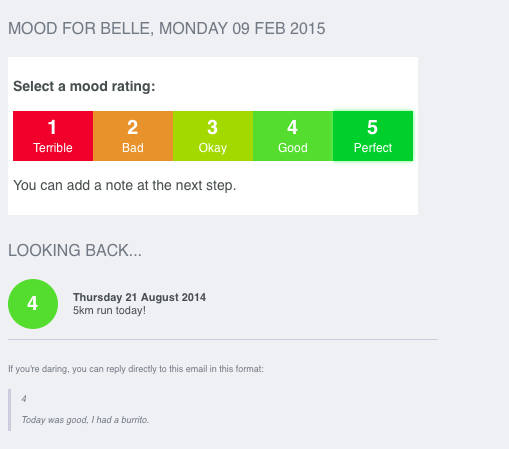
Now that we have mobile apps in beta testing we're working on a native experience for mood tracking. We've got native notifications and a snazzy interface for submitting your mood entry:
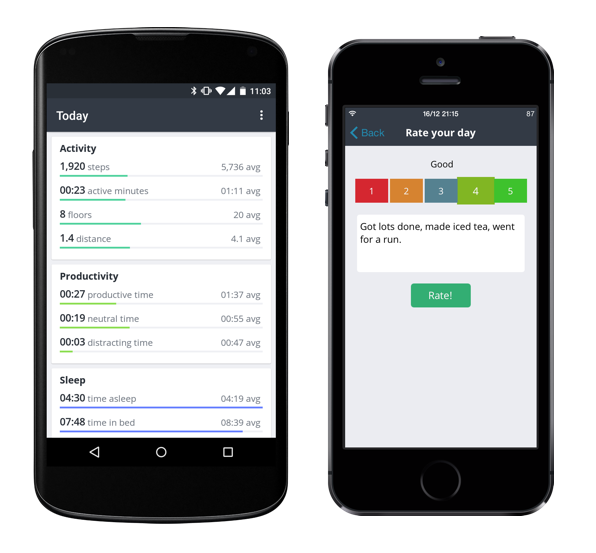
Whether they use our apps or the email interface, lots of our users love mood tracking. We never expected it to be such a central part of Exist, so we've been blown away by how many people mention it as one of their favourite features.
Although my co-founder Josh agrees with most of our users that reflecting on his day each night is a useful process, I generally dread it. I know that sounds crazy. I hate using my own app!
Here's why: I don't look forward to reflecting on my day because I find it's lots of effort. I don't like thinking back over my day to work out what rating I should choose. Reflecting is something I do a lot of naturally—all the more reason it's strange that I don't enjoy mood tracking—but I find it's easy for me to get caught up in my own thoughts too much. I prefer avoiding reflection when I'm aware I'm doing it, because it draws me in to wasted time and mental effort so often.
But I haven't stopped tracking my mood. There are three reasons I rate my day every night, despite the effort it takes.
The data is useful
When we added mood tracking I had a vague idea that it might be interesting to quantify how good or bad each day is (subjectively, of course). I had no idea what correlations I would discover, but I've found some fascinating ones.
For instance, I tend to be happier on days when I'm also productive:
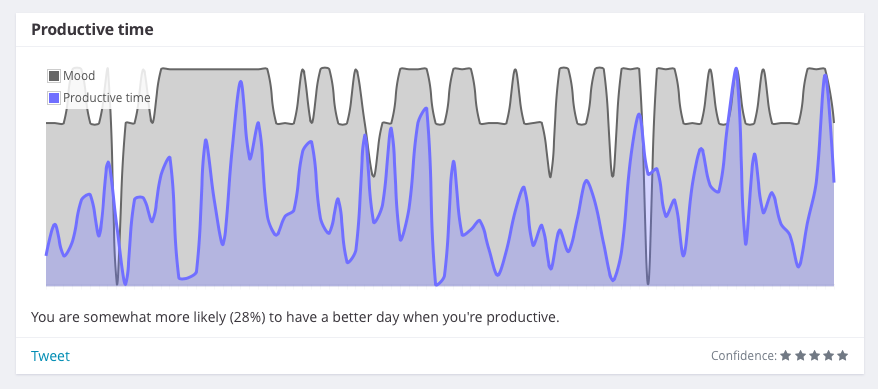
I don't seem to like cloudy days:
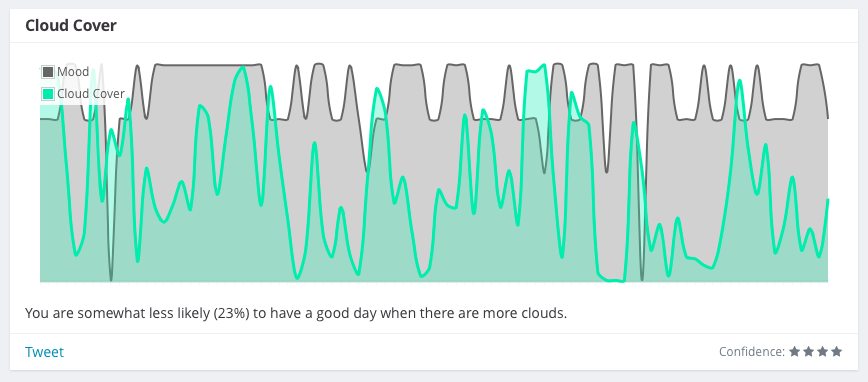
Or rainy days (we don't get snow in Melbourne):
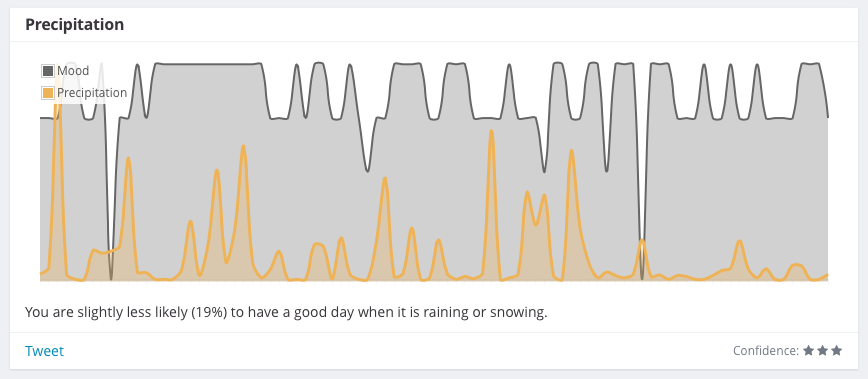
Over time, some of my correlations have changed. I used to have bad days when I listened to a lot of music. These days I have a weak correlation between good days and the number of tracks I've played:
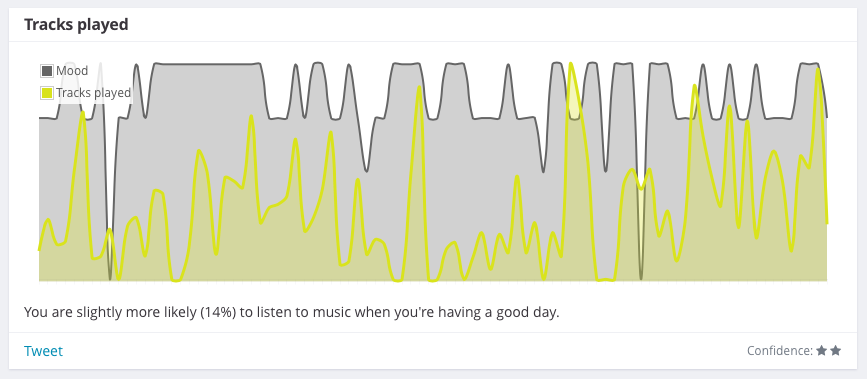
I also used to have around a 40% chance of having a good day on the weekend. Now I'm more likely to have bad days on weekends:
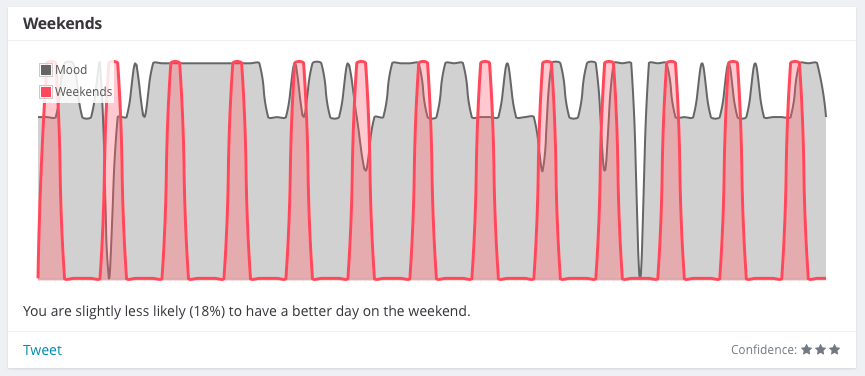
When Josh and I moved into our new Hello Code HQ late last year, we stopped having the clear distinction between work days and weekends that we'd had before. Now we're likely to be working on something every day, and there's little distinction between different days of the week.
My guess is that's why I've seen a change in these mood correlations. I listen to a lot of music while I'm working, and since that's pretty much every day, it's becoming more likely for me to have good days when I listen to music.
I'm more aware of my mood during the day
Although I find it a chore, knowing I'm going to reflect on my day at 9pm makes me more aware of how I feel as things are happening. If I'm feeling stressed or things aren't going my way, I have a framework for thinking about that now. Rather than pure frustration or anger, I can put a number on how I'm feeling. That's not necessarily the most healthy way to deal with emotions, but it helps to give me perspective. I might think just before lunch that my day is a 2/5 so far because it's not going well, but by 5pm so many good things have happened that it's rounded up to a 4.
I'm also more aware of how things affect me, so I can change my circumstances to increase my chances of a good day. I have a weak, but growing, correlation between bad days and events. Knowing this, I can make more informed decisions about which events I attend and perhaps skip them more often.
I also know that getting things done will likely have a good effect on my mood, so if I'm struggling come lunchtime, I can reset my expectations and focus on work I can complete and feel good about.
Reflecting on past notes is fun
A recent addition to our mood tracking is a feature called "Looking Back". In the nightly emails we include the mood entry you submitted on this day one year ago (or a random entry if you don't have one for that day):

If you've used apps like Timehop or Heyday, you'll know how much fun this kind of feature can be. I always look forward to opening my nightly mood email so I can see what I said about this day last year. Often a particular trend will emerge over a few days and each night I'll find another note in reference to it. One week I was attempting to go for a run every night, so my mood entry mentioned whether I'd been running or not for 5 or 6 days in a row. Another week of entries from last January mentioned the weather every day as a crazy summer heat wave hit Melbourne.
An extra fun part of getting these old mood entries is comparing them to what Josh gets in his email every night. We'll often find that we did something together that day, and both mentioned it in our notes. Recently we both had old mood entries referencing "exciting times for Exist" but neither of us had mentioned specifically what it was about. We didn't work it out, but we had a fun time guessing.

Mood tracking isn't for everyone, but I'm glad I've stuck with it. It took me a long time to see the full value of it, but if I'm ever feeling like it's too much effort these days I force myself to do it because I know I'll enjoy seeing those notes in a year's time.
If you want to try it for yourself, sign up for a free 14-day trial of Exist.
Subscribe Keep up to date with the Exist blog. Delivered to your inbox.